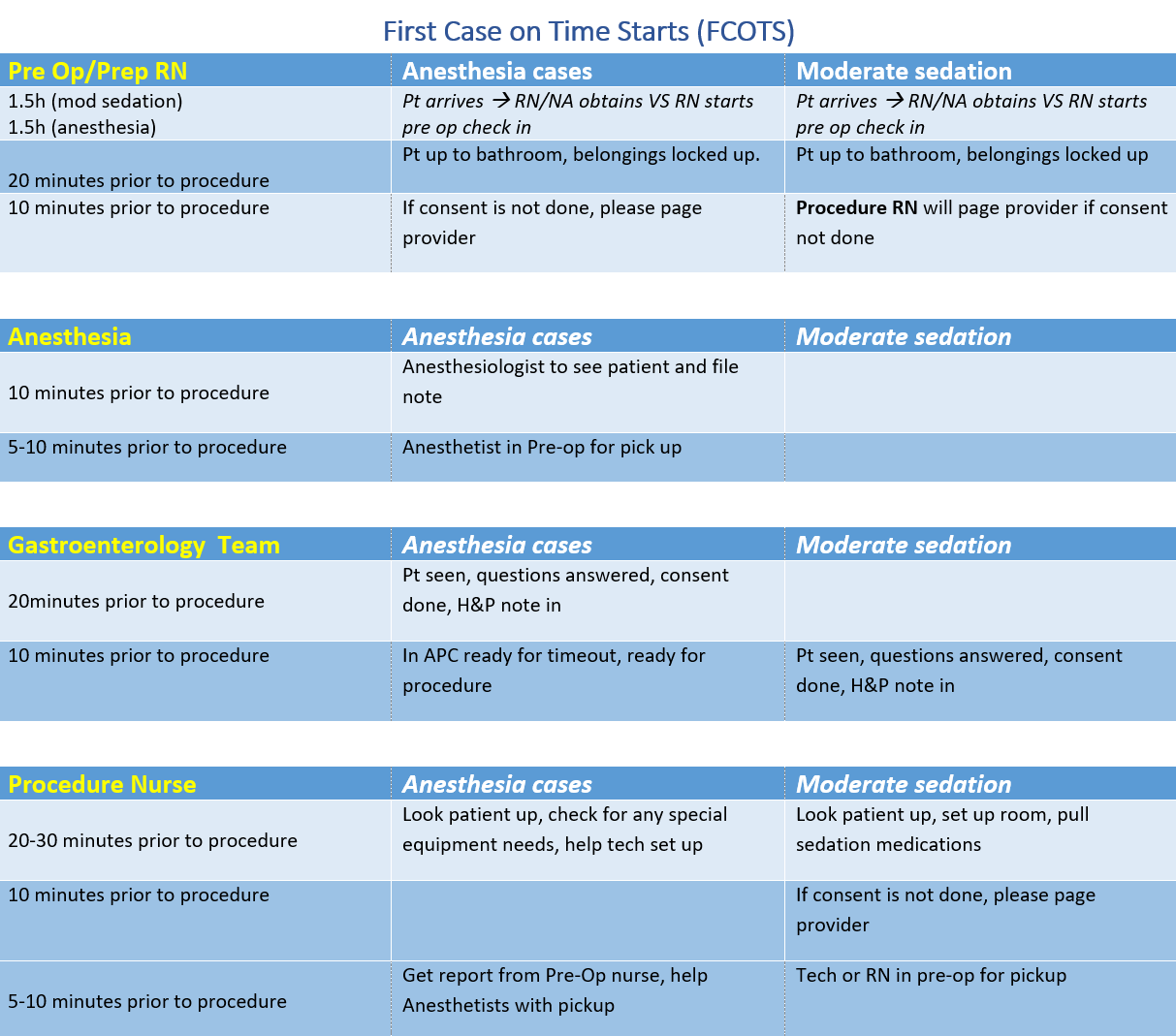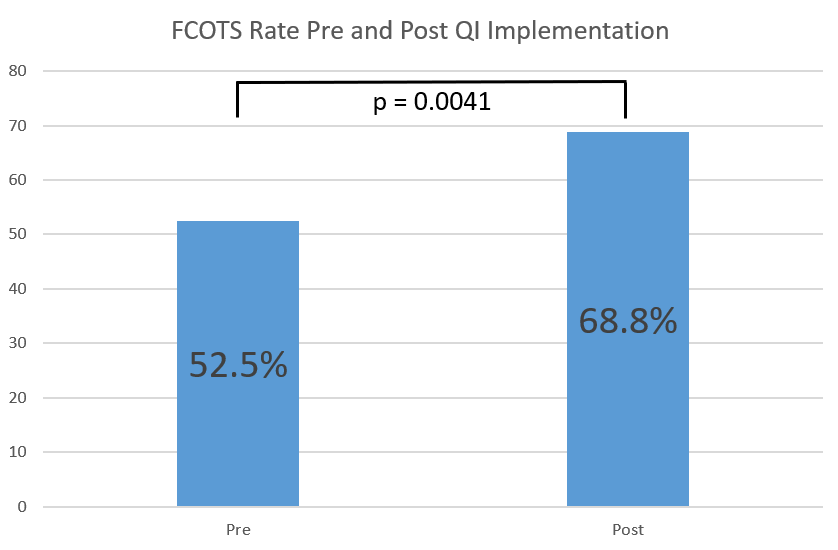Sunday Poster Session
Category: Practice Management
P1909 - Improving First Case On-Time Starts: A Quality Improvement Initiative in a Tertiary Care Hospital Based Endoscopy Unit
Sunday, October 26, 2025
3:30 PM - 7:00 PM PDT
Location: Exhibit Hall

Yash Hegde, MD
University of Wisconsin Hospitals and Clinics
Madison, WI
Presenting Author(s)
Yash Hegde, MD1, Mark Benson, MD2, Karen-McKenzie Butler, MSN, RN, CCRN1, Patrick Pfau, MD2, Jennifer Weiss, MD, MS2, Dana Ley, MD2, Sarah Missig, BSN, RN1, Deepak Gopal, MD, FACG2
1University of Wisconsin Hospitals and Clinics, Madison, WI; 2University of Wisconsin School of Medicine and Public Health, Madison, WI
Introduction: First case on-time start (FCOTS) is an important metric in procedural efficiency, resource utilization, and patient satisfaction in endoscopy units. Delays in FCOTS can lead to procedural backlogs, increased staff overtime, and reduced patient flow. Tertiary care centers that offer both general and advanced interventional endoscopy face unique operational challenges due to case complexity and multidisciplinary coordination. We identify barriers to FCOTS and implement interventions to improve start-time reliability.
Methods: This quality improvement (QI) study was conducted in a tertiary care hospital performing general and interventional advanced inpatient and outpatient endoscopy procedures. A multidisciplinary team consisting of gastroenterologists, anesthesiologists, and nursing staff was created with the goal of improving FCOTS. Baseline FCOTS data were collected from January 2024 to December 2024 using electronic medical record procedural logs. Beginning December 2024, interventions that took place included an initial communication of this QI project’s goals and expectations for procedural unit nursing staff in all phases of care, anesthesia providers, and gastroenterologists (Image 1). Distribution of a feedback collaboration tool, adjustment of staff start times to support FCOTS, weekly newsletters reporting FCOTS data, and meetings with providers to review their performance occurred. Barriers to timely starts were recorded. FCOTS rate was measured after the interventions took place over a six-month period. We used an independent t-test to compare FCOTS rates before and after interventions.
Results: The FCOTS rate increased from 52.5% to 68.8% post QI implementation (p = 0.0041)(Image 2). The average pre-operative phase to in procedure room time decreased by 13 min pre to post FCOTS QI implementation (94.6 min vs. 81.5 min, p= 0.0093). Delays in FCOTS included late arrival by anesthesia (14.3%), incomplete consent (7.1%), incomplete history and physical examination (7.1%), late arrival by proceduralist (7.1%), and non-provider causes (46.4%) including delays in room set-up, technical issues, incomplete room preparation, and late patient arrival.
Discussion: Implementation of a multidisciplinary QI initiative led to improved FCOTS rate in a tertiary care endoscopy center. Common barriers included provider and non-provider causes offering targeted interventions. These findings emphasize the importance of a collaborative, system-level approach to improve procedural efficiency.

Figure: Interventions that took place included an initial communication of this QI project’s goals and expectations for procedural unit nursing staff in all phases of care, anesthesia providers, and gastroenterologists

Figure: The FCOTS rate increased from 52.5% to 68.8% post QI implementation
Disclosures:
Yash Hegde indicated no relevant financial relationships.
Mark Benson indicated no relevant financial relationships.
Karen-McKenzie Butler indicated no relevant financial relationships.
Patrick Pfau indicated no relevant financial relationships.
Jennifer Weiss: Exact Sciences – Grant/Research Support.
Dana Ley indicated no relevant financial relationships.
Sarah Missig indicated no relevant financial relationships.
Deepak Gopal indicated no relevant financial relationships.
Yash Hegde, MD1, Mark Benson, MD2, Karen-McKenzie Butler, MSN, RN, CCRN1, Patrick Pfau, MD2, Jennifer Weiss, MD, MS2, Dana Ley, MD2, Sarah Missig, BSN, RN1, Deepak Gopal, MD, FACG2. P1909 - Improving First Case On-Time Starts: A Quality Improvement Initiative in a Tertiary Care Hospital Based Endoscopy Unit, ACG 2025 Annual Scientific Meeting Abstracts. Phoenix, AZ: American College of Gastroenterology.
1University of Wisconsin Hospitals and Clinics, Madison, WI; 2University of Wisconsin School of Medicine and Public Health, Madison, WI
Introduction: First case on-time start (FCOTS) is an important metric in procedural efficiency, resource utilization, and patient satisfaction in endoscopy units. Delays in FCOTS can lead to procedural backlogs, increased staff overtime, and reduced patient flow. Tertiary care centers that offer both general and advanced interventional endoscopy face unique operational challenges due to case complexity and multidisciplinary coordination. We identify barriers to FCOTS and implement interventions to improve start-time reliability.
Methods: This quality improvement (QI) study was conducted in a tertiary care hospital performing general and interventional advanced inpatient and outpatient endoscopy procedures. A multidisciplinary team consisting of gastroenterologists, anesthesiologists, and nursing staff was created with the goal of improving FCOTS. Baseline FCOTS data were collected from January 2024 to December 2024 using electronic medical record procedural logs. Beginning December 2024, interventions that took place included an initial communication of this QI project’s goals and expectations for procedural unit nursing staff in all phases of care, anesthesia providers, and gastroenterologists (Image 1). Distribution of a feedback collaboration tool, adjustment of staff start times to support FCOTS, weekly newsletters reporting FCOTS data, and meetings with providers to review their performance occurred. Barriers to timely starts were recorded. FCOTS rate was measured after the interventions took place over a six-month period. We used an independent t-test to compare FCOTS rates before and after interventions.
Results: The FCOTS rate increased from 52.5% to 68.8% post QI implementation (p = 0.0041)(Image 2). The average pre-operative phase to in procedure room time decreased by 13 min pre to post FCOTS QI implementation (94.6 min vs. 81.5 min, p= 0.0093). Delays in FCOTS included late arrival by anesthesia (14.3%), incomplete consent (7.1%), incomplete history and physical examination (7.1%), late arrival by proceduralist (7.1%), and non-provider causes (46.4%) including delays in room set-up, technical issues, incomplete room preparation, and late patient arrival.
Discussion: Implementation of a multidisciplinary QI initiative led to improved FCOTS rate in a tertiary care endoscopy center. Common barriers included provider and non-provider causes offering targeted interventions. These findings emphasize the importance of a collaborative, system-level approach to improve procedural efficiency.

Figure: Interventions that took place included an initial communication of this QI project’s goals and expectations for procedural unit nursing staff in all phases of care, anesthesia providers, and gastroenterologists

Figure: The FCOTS rate increased from 52.5% to 68.8% post QI implementation
Disclosures:
Yash Hegde indicated no relevant financial relationships.
Mark Benson indicated no relevant financial relationships.
Karen-McKenzie Butler indicated no relevant financial relationships.
Patrick Pfau indicated no relevant financial relationships.
Jennifer Weiss: Exact Sciences – Grant/Research Support.
Dana Ley indicated no relevant financial relationships.
Sarah Missig indicated no relevant financial relationships.
Deepak Gopal indicated no relevant financial relationships.
Yash Hegde, MD1, Mark Benson, MD2, Karen-McKenzie Butler, MSN, RN, CCRN1, Patrick Pfau, MD2, Jennifer Weiss, MD, MS2, Dana Ley, MD2, Sarah Missig, BSN, RN1, Deepak Gopal, MD, FACG2. P1909 - Improving First Case On-Time Starts: A Quality Improvement Initiative in a Tertiary Care Hospital Based Endoscopy Unit, ACG 2025 Annual Scientific Meeting Abstracts. Phoenix, AZ: American College of Gastroenterology.
